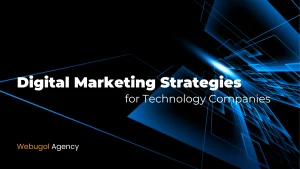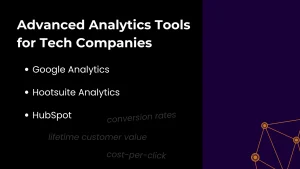Boost Your Technology Company’s Growth with Webugol’s Digital Marketing Strategies

Technology companies must grasp successful digital marketing tactics if they are to flourish in the increasingly digital terrain of today — they cannot only create new goods. In a competitive market with changing customer expectations, tech companies must create a strong online presence and connect with the proper audience.
Start-up owners looking to leverage digital marketing for technology as a potent tool for company expansion will find this guide very helpful. You will learn how to stay ahead and achieve results with your online marketing strategy.
Why Digital Marketing is a Game-Changer for Tech Companies
Technology companies need digital marketing solutions to have an online presence and reach their target audience. Customers today mostly rely on online platforms to explore and interact with brands since the digital terrain is developing fast.
Technology businesses may increase visibility, attract qualified prospects, and make data-driven choices with SEO, content marketing, and data analytics. Moreover, digital marketing helps to create loyalty using tailored outreach that increases client involvement.
Digital Marketing for Technology Companies: Key Strategies
Utilizing AI Marketing Tools
AI marketing tools are transforming the interaction businesses have with their customers. These solutions increase marketing decision-making with machine learning, data analytics, and automation.
Perfect instruments for improving consumer involvement are chatbots and artificial intelligence assistants. They support 24/7, answer questions instantly, and nurture leads. By examining target audience preferences and delivering customized communications at the ideal times, artificial intelligence also helps maximize email marketing campaigns.
Companies may model market trends and client needs with predictive analytics, another valuable AI function. Providing solutions that satisfy growing needs, helps technology businesses to keep ahead of competitors. Marketing techniques can be improved by AI tools like recommendation engines, programmatic advertising, and social media sentiment analysis, improving ROI and consumer interactions.
Purchasing artificial intelligence marketing products not only improves effectiveness but also helps your business to be a creative leader in the tech-driven industry.
Leveraging SEO to Drive Organic Growth
Prioritize on-page and off-page SEO for organic growth. Improving the visibility of your website and generating focused attention on it depends on effective digital marketing strategies.
- On-page Search Engine Optimization optimizes web pages for search engine results. This covers perfecting title tags, meta descriptions, headers, and alt text for images to enable search engines to more easily reach your content. Make sure the content is high-quality, interesting, and relevant. Additionally, enhancing user experience and rankings involves structuring your content using appropriate headings and including internal links.
- Off-Page Search Engine Marketing builds domain authority through healthy backlinks. Partnerships, guest writing in reputable tech magazines, or contacting industry thought leaders and influencers will help you to do this. Engagement on social media and brand discussions can boost off-page SEO and organic traffic to your site.
Conducting Keyword Research
Keyword research is essential in digital marketing for technology. Knowing what your readers are looking for enables you to focus on the appropriate words that speak to them. Use Ahrefs, SEMrush, or Google Keyword Planner to find niche-relevant, high-traffic, low-competition keywords. Regular improvement of your keyword approach will help you to keep ahead of the ever-changing tech scene.
Content Marketing Strategies for Technology Companies
Tech companies may build thought leadership, trust, and audience engagement with content marketing. Technology companies may solve problems, inform possible consumers, and highlight the advantages of their products by producing and distributing worthwhile, pertinent content.
Tips for Effective Content Marketing:
- Focus on Your Audience’s Needs: Always produce content for your audience. Solve their problems, respond to their inquiries, and offer pragmatic analysis.
- Maintain Consistency: Maintain audience engagement and brand awareness by publishing across platforms.
- Repurpose Content: Repurpose your writing to maximize its value — that is, turn webinar highlights into blog entries or social media snippets.
- Leverage SEO: Improve search ranks and visibility by optimizing your content using tech-related keywords from your study.
Technology companies can not only enlighten and involve their audience but also generate qualified leads and build long-term alliances by using strategic digital marketing for technology.
Paid Advertising: Maximizing ROI
Paying for advertising helps you stand out, but you must choose your platforms carefully. For tech marketers, top choices are Google Ads, LinkedIn, and Twitter Ads. Set KPIs like CPA or CTR and adjust digital marketing campaigns based on performance. Little changes can make a big difference in return on investment.
Conduct Thorough Audience Research: Define your target audience precisely to ensure your adverts reach the correct people. Understand demographics, interests, and behavior by using techniques including audience insights and analytics. Well-targeted ads save waste and boost conversions.
Create Retargeting Campaigns: Retarget people who had interacted with your ads or website but did not convert. Retargeting boosts brand awareness and encourages buyers to move further.
Monitor Ad Quality Scores: Maintaining high-quality scores for sites like Google Ads will help to significantly reduce your cost-per- click and enhance ad placement. Create relevant ads with powerful CTAs and optimized landing pages to boost scores.
Budget Allocation Based on Performance: Review your campaign statistics often and provide more funds to the channels or ads that work especially well. Reduce low-performing ones to maximize ROI.
These marketing efforts will help you guarantee that every dollar spent on paid advertising helps produce more results and better total returns.
Social Media Strategies: Engaging & Educating
Tech firms can use social media marketing to reach their target audience and boost their voice. Selecting the correct platforms lets you engage your audience and demonstrate your skills. LinkedIn, Twitter, and YouTube offer unique chances to connect and expand your business.
Tech brands benefit from tutorials, webinars, and explainers. It builds audience trust and establishes your brand as an expert. Tutorials can explain difficult products, webinars provide real-time participation, and explainers can make your value proposition more approachable.
Using digital marketing for technology companies, your brand may connect with the right people and flourish long-term.
Email Marketing for Long-Term ROI
Emails provide unmatched chances for lead nurturing. Create campaigns that add value to your prospects instead of sending generic emails that go unnoticed. Send use-case guides to demonstrate how your product solves a common problem or boosts efficiency. Offer special beta testing invites to let prospects sample new features first.
Create campaigns that add value to your prospects instead of sending generic emails that go unnoticed. Send use-case guides to demonstrate how your product solves a common problem or boosts efficiency. Offer special beta testing invites to let prospects sample new features first. Value-driven, customized communications increase trust and engagement, making outreach more effective. Target customers at different buyer’s journey stages with your mailing list. Personalizing messages by name or industry might enhance engagement.
Data-Driven Digital Marketing for Technology Companies
Target customers at different buyer’s journey stages with your mailing list. Personalizing messages by name or industry might enhance engagement. Data powers digital marketing success, enabling smarter decisions and greater results. Advanced analytics tools reveal which initiatives work and which need refinement, helping businesses adapt and survive in a competitive environment.
Tools for Tech Companies:
- Google Analytics: The essential tool for tracking website traffic, user activity, and engagement. You can optimize the user journey by identifying which pages perform well and where users drop off.
- Hootsuite Analytics: It provides precise social media insights from post engagement to audience growth. It shows how your social approach supports your goals.
- HubSpot: A robust platform for managing multi-channel campaigns, including email marketing statistics and lead tracking.
Conversion rates, cost-per-click, and lifetime client value can help you measure the long-term benefits of customer acquisition. These digital marketing technologies and metrics let you optimize campaigns.
Training Software
Teams require training software to succeed in a competitive digital landscape. These solutions streamline learning, collaboration, and progress monitoring across roles and departments.
Tools for Employee Training:
- SAP Litmos is a cloud-based, scalable learning management.
- TalentLMS will design, deliver, and track compelling training.
- Adobe Captivate for eLearning customisation.
- Training software should have configurable modules, progress monitoring, and workplace integration. A well-trained crew increases productivity and aligns with business goals and strategies.
Outreach Tools
Maintaining and increasing your business network requires effective communication and outreach. Essential tools for outreach improvement:
- Mailchimp for audience segmentation and email marketing.
- HubSpot for simplified CRM and automated outreach.
- Buffer to schedule and manage social media postings to engage audiences.
To maximize efficiency and impact, use outreach tools with automation, analytics, and connectors. Strong outreach improves brand visibility, engagement, and trust.
- Google Ads for audience insights-driven targeted ads and ROI maximization.
- Real-time Data Analytics for programmatic advertising across many channels from The Trade Desk.
- Adobe Advertising Cloud for AI-driven optimization and creative management in integrated, cross-channel advertising.
AdTech software helps companies target, optimize, and evaluate campaign results. Advertising on these channels can greatly increase reach and impact.
Conclusion: Crafting a Winning Digital Marketing Strategy
Digital marketing for technology is not the ultimate solution. Its customized, data-driven solutions demand experimentation, adaptability, and ongoing improvement. Every audience is different, hence developing advertisements that appeal depends on knowing their tastes, habits, and pain areas. Tech companies can create marketing campaigns that generate buzz and real, measurable results by focusing on their audience, using the right digital tools (analytics platforms, automation software, and social media advertising), and adapting to changing trends. The secret is to be adaptable and always improve your plans to satisfy the changing needs of the market.
Explore Webugol’s knowledge today to learn how to implement these techniques. Our team is here to improve your marketing game whether your project is developing a long-term social media community or redesigning your website SEO.




